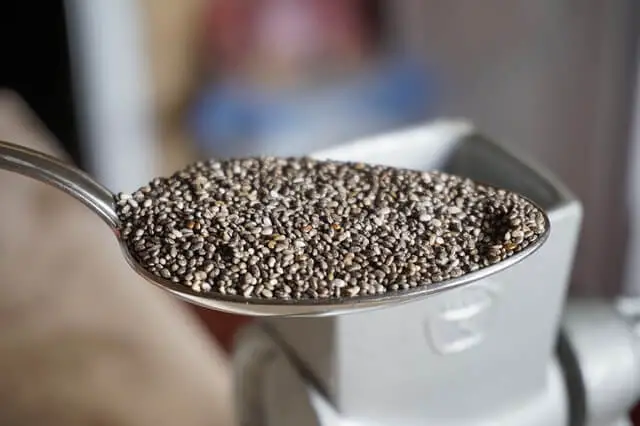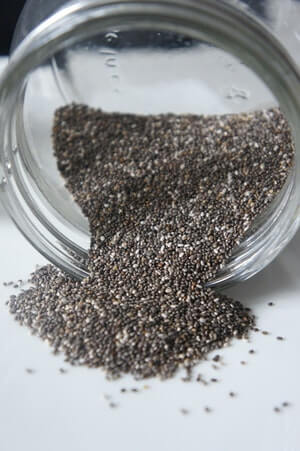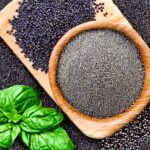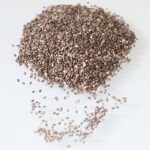Chia seeds have been a staple food in the diets of indigenous people in Central and South America for centuries and have gained popularity in recent years as a health food. One of the main reasons for their popularity is their high content of omega-3 fatty acids, specifically alpha-linolenic acid (ALA). Omega-3s are essential nutrients that play a crucial role in brain function, heart health, and the immune system.
They have anti-inflammatory effects and have been shown to have a range of potential health benefits, including reducing the risk of heart disease and stroke, improving symptoms of anxiety and depression, and reducing inflammation.
In this post, we will delve into the nutritional profile of chia seeds, the health benefits of omega-3s, and how to incorporate chia seeds into your diet in a healthy and balanced way.
What are Omega-3s?
Omega-3 fatty acids are a type of polyunsaturated fat that is essential for human health. They are called “essential” because the body cannot produce them on its own and must obtain them from the diet. Omega-3 fatty acids play a crucial role in brain function, heart health, and the immune system. They have anti-inflammatory effects and have been shown to have a range of potential health benefits.
There are three main types of omega-3 fatty acids: alpha-linolenic acid (ALA), eicosapentaenoic acid (EPA), and docosahexaenoic acid (DHA). ALA is found in plant-based sources, such as flaxseeds, chia seeds, and walnuts. EPA and DHA are found in fatty fish, such as salmon, mackerel, and sardines, as well as in algae-based supplements.
The human body can convert ALA into EPA and DHA, but this process is inefficient and the conversion rate varies from person to person. For this reason, it is important to include a variety of sources of omega-3s in the diet to ensure adequate intake of these essential fatty acids.
Omega-3s have been shown to have a range of potential health benefits, including reducing the risk of heart disease and stroke, improving symptoms of anxiety and depression, and reducing inflammation. They may also have benefits for brain health, eye health, and the immune system. It is important to get enough omega-3s in the diet to support these functions and potentially reduce the risk of chronic diseases.
Importance of Omega-3s in Brain Function, Heart Health, and Immune System
Omega-3 fatty acids are essential nutrients that play a crucial role in brain function, heart health, and the immune system. They have anti-inflammatory effects and have been shown to have a range of potential health benefits.
In terms of brain function, omega-3s are important for the development and function of the brain. They have been shown to improve cognitive function, particularly in older adults and those with cognitive decline. Omega-3s may also have a positive effect on mental health, including reducing the risk of depression and anxiety.
Omega-3s are also important for heart health. They have been shown to reduce the risk of heart disease and stroke by lowering blood pressure, reducing inflammation, and improving cholesterol levels. Omega-3s may also help to lower the risk of arrhythmias, or irregular heartbeats, which can increase the risk of heart attack and stroke.

In terms of the immune system, omega-3s have been shown to have anti-inflammatory effects, which may help to reduce the risk of chronic diseases such as arthritis, asthma, and inflammatory bowel disease. Omega-3s may also have a positive effect on the immune system by increasing the production of antibodies, which help to fight off infections.
Overall, omega-3s are essential nutrients that play a crucial role in brain function, heart health, and the immune system. It is important to get enough omega-3s in the diet to support these functions and potentially reduce the risk of chronic diseases.
Chia Seeds as a Good Source of Omega-3s
Chia seeds are a good source of omega-3 fatty acids, specifically alpha-linolenic acid (ALA). Omega-3s are essential nutrients that play a crucial role in brain function, heart health, and the immune system. They have anti-inflammatory effects and have been shown to have a range of potential health benefits.
Omega-3s in Chia Seeds
One tablespoon of chia seeds contains about 1.8 grams of omega-3 fatty acids. This is a significant amount, considering that the recommended daily intake of omega-3s for adults is between 1.1 and 1.6 grams.
This means there are about 17 grams of omega-3s per 100 grams of chia seeds.
However, it’s worth noting that the majority of the omega-3s in chia seeds are alpha-linolenic acid (ALA), which is a plant-based form of omega-3s that the body can convert into the more biologically active forms of omega-3s, eicosapentaenoic acid (EPA) and docosahexaenoic acid (DHA). The conversion of ALA to EPA and DHA is not very efficient, so it’s recommended to get a higher amount of this.
Chia Seeds ALA Content
One tablespoon of chia seeds contains about 2.5 grams of ALA, which is about a third of the recommended daily intake for adults. This means that 100 grams of chia seeds contain about 17 grams of Omega-3s.
Chia seeds are a plant-based source of ALA, which is the precursor to EPA and DHA, two other types of omega-3s that are found in fatty fish. The human body can convert ALA into EPA and DHA, but this process is inefficient and the conversion rate varies from person to person. For this reason, it is important to include a variety of sources of omega-3s in the diet to ensure adequate intake of these essential fatty acids.
Incorporating chia seeds into your diet is an easy way to increase your intake of omega-3s.
However, it’s important to note that while chia seeds are a good source of these essential fatty acids, they are not the only source. It’s still important to include a variety of foods in your diet that contain omega-3s, such as nuts, seeds, and plant-based oils.
Chia Seeds Omega-3 to 6 Ratio
Chia seeds are a good source of omega-3 and omega-6 fatty acids. Omega-3s and omega-6s are both essential fatty acids that play important roles in the body. They have different functions and are involved in various physiological processes, including inflammation and immune function.
One tablespoon of chia seeds contains about 2.5 grams of alpha-linolenic acid (ALA), a type of omega-3 fatty acid, and about 1.6 grams of linoleic acid (LA), a type of omega-6 fatty acid. The ratio of omega-3s to omega-6s in chia seeds is about 1.6:1.
It’s important to have a balance of omega-3s and omega-6s in the diet, as they work together to support various physiological processes in the body. However, the typical Western diet tends to have a higher ratio of omega-6s to omega-3s, which has been linked to an increased risk of chronic diseases such as heart disease and type 2 diabetes.
Incorporating chia seeds into your diet is an easy way to increase your intake of both omega-3s and omega-6s. However, it’s important to note that while chia seeds are a good source of these essential fatty acids, they are not the only source. It’s still important to include a variety of foods in your diet that contain omega-3s and omega-6s, such as fatty fish, nuts and seeds, and plant-based oils.
It’s also a good idea to talk to your doctor or a registered dietitian about your specific nutrient needs and how to incorporate chia seeds and other sources of omega-3s and omega
Chia Seeds for Omega-3s in Pregnancy
During pregnancy, omega-3s are especially important for the development of the brain and eyes of the growing fetus.
Chia seeds are a good source of alpha-linolenic acid (ALA), a type of omega-3 fatty acid.
Just remember that during pregnancy, it’s important to include a variety of sources of omega-3s in the diet to ensure adequate intake of these essential fatty acids. In addition to chia seeds, other good plant-based sources of omega-3s include nuts and seeds, such as flaxseeds and walnuts, as well as plant-based oils, such as flaxseed oil, avocado oil and canola oil.
Chia Seeds vs Salmon for Omega-3s
Chia seeds and salmon are both good sources of omega-3 fatty acids, but they contain different types of omega-3s and have different nutrient profiles overall.
Chia seeds are a good source of alpha-linolenic acid (ALA), which is a plant-based form of omega-3s. One hundred grams of chia seeds contains about 17 grams of omega-3s, with the majority of the omega-3s being ALA.
Salmon, on the other hand, is a rich source of EPA and DHA, which are the more biologically active forms of omega-3s. One hundred grams of salmon contains about 2-3 grams of EPA and DHA.
However, a current study suggests that the body is able to convert ALA from plant-based foods into the necessary EPA and DHA. And, for vegans and vegetarians, this conversion rate seems to be higher, providing the needed EPA and DHA.
Other Nutrients Found in Chia Seeds (Protein, Fiber, Antioxidants)
In addition to ALA, chia seeds are also a good source of other nutrients, including fiber, protein, and antioxidants.
Fiber is an important nutrient that helps to support digestion and may help to reduce the risk of chronic diseases such as heart disease and type 2 diabetes. One tablespoon of chia seeds contains about 5 grams of fiber, which is about 20% of the recommended daily intake for adults.
Protein is an essential nutrient that is important for building and repairing tissues, as well as for the production of enzymes and hormones. Chia seeds are a good source of protein, with one tablespoon containing about 2 grams.
Antioxidants are compounds that help to protect cells from damage caused by free radicals, which are unstable molecules that can cause oxidative stress in the body. Chia seeds are a good source of antioxidants, including flavonoids and polyphenols, which have been shown to have a range of potential health benefits, including reducing the risk of chronic diseases.
In addition to their content of fiber, protein, and antioxidants, chia seeds are also low in calories and can be easily added to a variety of dishes, including smoothies, oatmeal, yogurt, and baked goods. Incorporating chia seeds into your diet is an easy way to increase your intake of these nutrients and potentially benefit your overall health.
Chia Seeds Benefits
Chia seeds don’t only provide benefits from their Omega-3s. Here are some of the other potential benefits of chia seeds:
- High in fiber: Chia seeds are a good source of fiber, with about 10 grams of fiber per ounce (28 grams). This can help support digestive health and prevent constipation.
- High in omega-3s: Chia seeds are a good source of omega-3 fatty acids, with about 17 grams of omega-3s per 100 grams of chia seeds. Omega-3s are important for brain health and have anti-inflammatory effects.
- High in antioxidants: Chia seeds are a rich source of antioxidants, which can help protect the body from oxidative stress and the damaging effects of free radicals.
- May help with weight loss: Chia seeds are low in calories and high in fiber, which can help promote feelings of fullness and reduce calorie intake. Some studies have shown that adding chia seeds to the diet can help with weight loss.
- May improve blood sugar control: Chia seeds have a low glycemic index, which means they are absorbed slowly and can help keep blood sugar levels stable. Some studies have shown that adding chia seeds to the diet can improve blood sugar control in people with diabetes.
- May improve heart health: Chia seeds are high in alpha-linolenic acid (ALA), a type of omega-3 fatty acid that has been shown to have a beneficial effect on heart health. Some studies have found that adding chia seeds to the diet can help lower blood pressure and improve cholesterol levels.
You can find even more chia seeds benefits here.
Health Benefits of Omega-3s
Omega-3 fatty acids are essential nutrients that play a crucial role in brain function, heart health, and the immune system. They have anti-inflammatory effects and have been shown to have a range of potential health benefits. Here are a few of the potential health benefits of omega-3s:
- Reducing the risk of heart disease and stroke: Omega-3s have been shown to reduce the risk of heart disease and stroke by lowering blood pressure, reducing inflammation, and improving cholesterol levels.
- Improving symptoms of anxiety and depression: Omega-3s may have a positive effect on mental health, including reducing the risk of depression and anxiety.
- Reducing inflammation: Omega-3s have anti-inflammatory effects, which may help to reduce the risk of chronic diseases such as arthritis, asthma, and inflammatory bowel disease.
- Supporting brain health: Omega-3s are important for the development and function of the brain. They have been shown to improve cognitive function, particularly in older adults and those with cognitive decline.
- Supporting eye health: Omega-3s may have a positive effect on eye health, including reducing the risk of age-related macular degeneration and dry eye syndrome.
- Supporting the immune system: Omega-3s may have a positive effect on the immune system by increasing the production of antibodies, which help to fight off infections.
Overall, omega-3s are essential nutrients that play a crucial role in brain function, heart health, and the immune system. It is important to get enough omega-3s in the diet to support these functions and potentially reduce the risk of chronic diseases.
How to Use Chia Seeds in Your Diet
Chia seeds are a small, nutrient-dense food that is a good source of alpha-linolenic acid (ALA), a type of omega-3 fatty acid, as well as fiber, protein, and antioxidants. They are low in calories and can be easily added to a variety of dishes to increase your intake of these nutrients. Here are a few ways to incorporate chia seeds into your diet:
- Add them to smoothies: Chia seeds can be added to smoothies for a boost of nutrients and a thickening effect. They can be mixed in with other ingredients such as fruit, yogurt, and milk or plant-based milk.
- Sprinkle them on oatmeal: Chia seeds can be sprinkled on top of oatmeal or mixed in before cooking for a boost of nutrients. They can also be mixed with other seeds, such as flaxseeds or hemp seeds, for added nutrients.
- Mix them into yogurt: Chia seeds can be mixed into yogurt for a crunchy texture and a boost of nutrients. They can also be mixed with other seeds and nuts for added flavor and crunch.
- Add them to baked goods: Chia seeds can be added to baked goods, such as muffins and bread, for a boost of nutrients. They can also be mixed with other seeds and nuts for added flavor and texture.
Incorporating chia seeds into your diet is an easy way to increase your intake of omega-3s and other nutrients. You can start with as little as 1 tsp of chia seeds everyday in order to start getting some of the benefits. You can later increase that amount gradually, as outlined in How Many Chia Seeds Per Day.
However, it’s important to note that while chia seeds are a good source of these nutrients, they are not the only source. It’s still important to include a variety of foods in your diet that contain omega-3s, such as nuts, seeds, and plant-based oils.
Final Thoughts
In conclusion, chia seeds are a small, nutrient-dense food that is a good source of omega-3 fatty acids, specifically alpha-linolenic acid (ALA). Omega-3s are essential nutrients that play a crucial role in brain function, heart health, and the immune system. They have anti-inflammatory effects and have been shown to have a range of potential health benefits, including reducing the risk of heart disease and stroke, improving symptoms of anxiety and depression, and reducing inflammation.
Chia seeds are also a good source of fiber, protein, and antioxidants, and are low in calories. They can be easily added to a variety of dishes, including smoothies, oatmeal, yogurt, and baked goods. Incorporating chia seeds into your diet is an easy way to increase your intake of omega-3s and other nutrients.
However, it’s important to note that while chia seeds are a good source of these nutrients, they are not the only source. It’s still important to include a variety of foods in your diet that contain omega-3s, such as fatty fish, nuts and seeds, and plant-based oils.
Lance has been passionate about the plant-based diet and we have been following a whole food plant-based diet for over 5 years. We focus on health, natural healing, weight management, animal rights, and the health of the planet and environment by focusing on whole plant-based foods and sustainable practices.
Learn more at the About Me page and follow on social media at the links below.





